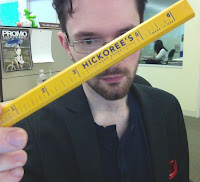If there’s one thing humanity takes seriously, it’s leisure time. Looked at across cultures and age groups, there is an almost uncountable variation in human play, from retired and rich Massachusetts socialites playing a game of polo to a bunch of SoCal tween hoodlums fooling around with a pack of matches and “borrowed” lighter fluid for the first time. All along this long and varied scope of human play (the “polo-to-pyromania” span if you will), at every task and every game and every activity, there are about a billion different invented tools out there to help people with their fun.
Different mallets and stirrups for the same game of polo. Different matches and cross-state fireworks for the same harmless youthful pyromania. Human inventiveness has created so many tools and toys, drilling down to a ridiculous level of detail and ornate quality, all for the sake of having the maximum amount of fun. Awesome if you like having fun, sure, but certainly complicated if you’re planning a promotional campaign involving play.
There are more kinds of toys than there are magazine pages in the world, but here are a few different types of toys along with some handy tips on how to best work with them. Because make no mistake, the only thing more serious than fun and games is when fun, games, marketing and money meet.
STUFFED ANIMALS
Capitalizing on the human need to look at and squeeze “cute wittly wubsy-bubsy” things, stuffed animals are excellent promotional toys perfect for a wide range of demographics and purposes.
WHAT TO LOOK OUT FOR:
“The most important thing is how soft a plush animal feels,” said Jenny Straub, director of marketing for Vitronic Promotional Group, Mason, Ohio. “The ‘fur’ should not feel waxy or rough,” she explained. She noted too that it can be worthwhile to request samples to check and see how an animal is stuffed. “There are different ways in which an animal can be stuffed,” she said. “Some animals are stuffed heavier in the arms and legs, while others have more stuffing in their bellies or backsides.”
A CASE STUDY:
Straub related an anecdote where one of Vitronic’s stuffed animals, Tucker the bear, was used in a pinch to calm a panicked, elderly hospital patient. The 101-year-old mother-in-law of one of Vitronic’s sales reps was seriously ill at the hospital and in need of an I.V. line. She was too uncooperative for the nurses to restrain and give an I.V. to, until the sales rep remember the stuffed animal he had in his car.
Quoted Straub, “Our rep said, ‘When I gave Tucker to Lena [the mother-in-law], everything slowed down. The fighting stopped and the lab people did their work. Tucker stayed with her in the hospital for 10 days. The doctors and nurses commented on how this little bear made such a difference. Sometimes, we just think about the sale and forget the power of our products.'”
THE MOST IMPORTANT THING:
Versatility. “When you give plush, the pleasure the recipients feel transcends age, gender and nationality,” said Straub. “Plush is versatile enough to show creativity, tenderness, friendliness and a sense of humor.”
LIGHT-UP TOYS
Put a tiny blinking light in something and you’ve created a guaranteed human attention hook (see: goofy party bracelets, laser pointers and all of the best toy robots). Pair a blinking light with a toy, and now you’ve got something so entertaining it ruins the risk of wholly absorbing a person’s consciousness.
WHAT TO LOOK OUT FOR:
“First and foremost, distributors should only buy toys that are CPSIA-compliant and carry mercury-free batteries,” said Michael Bistocchi, senior vice president, sales and marketing, CleggPromo, Gardena, Calif. He explained that it is also important to know how long you need the batteries for the lights to last. “Battery life is dependent on the number of lights and the length of activation every time it activates,” he said. He also mentioned not to worry about bulb life, as most toys use L.E.D. lights. “L.E.D.s never burn out,” he said. “Usually the toy or product is no longer used before the L.E.D.s stop working.”
DEMOGRAPHICS TO CONSIDER:
“Kids love light up products in general,” said Bistocchi. “Financial institutions, automotive companies and [high tech] are the biggest purchasers,” he added.
THE MOST IMPORTANT THING:
“Safety should be your first priority,” stated Bistocchi. “The repercussions are far too extensive and everyone can potentially lose if an unsafe product gets into the wrong hands. It is definitely not worth the risk.”
ARTISTIC TOYS
Maybe because the crushing despair of the 9-to-5 work grind hasn’t wholly crushed their spirits yet, or maybe because their tiny minds are simple enough to be delighted by drawing a lumpy orange circle and passing it off as the sun, but kids love to draw. More than just crayons (though they certainly play a part), there are plenty of artistic toys out there to make the most of children’s love of expressing themselves.
WHAT TO LOOK OUT FOR:
“The first thing is always product safety,” said Josh Goodelman, vice president of Liqui-Mark Corp., Hauppauge, N.Y. “Any product in general in the industry, keeping up to date with the new regulations the government’s imposing, child safety laws, and having all the proper testing documents for nontoxicity and CPSIA-compliance is a serious issue.”
A CASE STUDY:
Goodelman detailed a recent promotion Liqui-mark had done involving three companies promoting themselves together. Pairing decorated crayons with imprinted packaging and an insert card that told a story promoting two of the brands together, they were able to create an item that pleased all three companies. “The final product came out beautifully,” said Goodelman. “We were able to get creative with custom packaging, and then it’s simply taking a retail product and turning it into a promotional one.”
A PROMOTION IDEA:
“Banks,” said Goodelman. “Banks use crayons as incentive gifts. A child comes in and deposits 10 dollars in his or her savings account, they get a new crayon with the bank’s logo printed on it,” he explained. “It’s enticing the child to continue to save money to get another crayon gift.”


